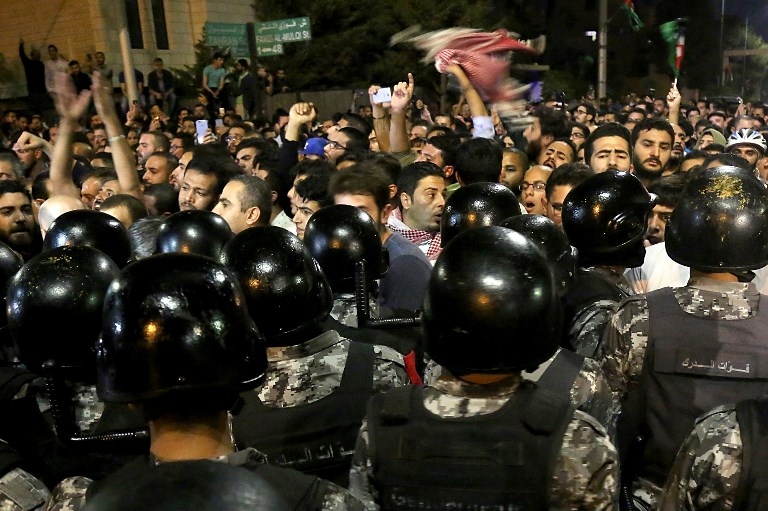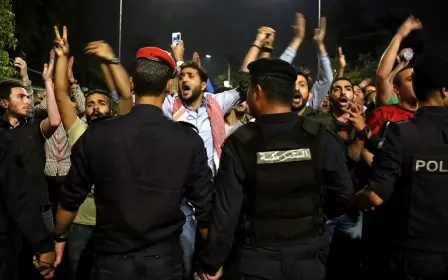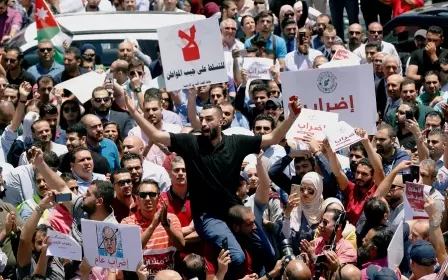Jordan king summons PM over anti-government protests

Jordan's King Abdullah was expected on Monday to ask Prime Minister Hani Mulki to resign to soothe widespread anger over economic policies that have sparked the largest protests in several years and dozens of arrests, political sources said.
Thousands of Jordanians took to the streets of the capital Amman and main provincial towns again on Sunday, extending days of protests that have shaken Jordan, a staunch US ally that has remained stable through years of turmoil in the region.
Police chief Major General Fadel al-Hamoud said security forces had detained 60 people for breaking the law during the protests and 42 security force members had been injured, but protests remained under control.
"Rest assured, Jordan is a safe and secure country, and things are under control," said Major General Hussein Hawatmeh, head of the Gendarmerie security department, appearing along with Hamoud at a news conference.
Public anger has grown over government policies since a steep general sales tax hike earlier this year and the abolition of bread subsidies, both measures driven by the International Monetary Fund (IMF).
The political sources said Abdullah had summoned Mulki for an audience in the king's palace later on Monday.
Mulki, a business-friendly politician, was appointed in May 2016 and given the responsibility of reviving a sluggish economy and business sentiment hit by regional turmoil. The tax increases have caused his popularity to plummet.
The protests, the biggest in Jordan in years, widened on Saturday after Mulki refused to scrap a bill increasing personal and corporate taxes, saying it was up to parliament to decide.
Demonstrators who converged near the Cabinet office said they would disband only if the government rescinded the tax bill it sent to parliament last month.
Jordanian MPs will also seek the king's permission on Monday to convene an exception session to be held as soon as possible over the planned measures, Petra news agency reported.
Despite these moves, the head of all trade unions in Jordan said protest action will continue this week.
'The next strike is on Wednesday even if the government quits today'
- Ali Aloboos, head of all Jordanian trade unions
"The next strike is on Wednesday even if the government quits today," said Ali Aloboos, also head of the Jordanian Engineers Association. "We need to change the tactic of judgement not only persons."
Protesters have called on Mulki to step down, vowing they will not "kneel" and earning support from trade unions and more than 50 MPs opposed to the new taxation.
The king summoned the prime minister for a meeting on Monday hours after around 5,000 people rallied outside Mulki's office in Amman, on the fifth consecutive day of protests in the Jordanian capital and other cities.
"Oh, Mulki, listen well, the people of Jordan will not kneel," they chanted as they faced down a heavy security presence.
Some demonstrators held up signs that read "We will continue (to protest) until the government quits".
In recent days, Jordanians shared a cartoon of Mulki saying: "We could not fight poverty, so we will fight poor people."
Parliament Speaker Atef Tarawneh said on Monday that parliament has "a great desire" for the government to withdraw the proposed changes."The parliament is heading today towards seeking his majesty the king's permission to hold an exceptional session as soon as possible," Petra news agency citied Tarawneh as saying.
"Withdrawing the law will defuse the protests that some areas of the kingdom are witnessing as a result of government haste in sending the amendments (to parliament) before holding a comprehensive dialogue about them," he added.
Austerity Jordan
Jordan, a mostly desert kingdom with few resources, has seen prices of several basic goods and services such as bread, fuel and electricity steadily rise over the past year as it attempts to fulfil austerity measures agreed with the IMF in return for financial support.
In an unprecedented move, Crown Prince Hussein bin Abdullah visited the protest site outside the prime minister's office at dawn on Monday and spoke to security forces who had deployed en masse to keep protesters at bay.
"They must be able to express themselves and voice their opinions and our duty is to protect them," the crown prince told security forces in reference to the protesters.
"We and they support the king. We want to protect this country," he added.
Last month, the government proposed a new income tax law, yet to be approved by parliament, aimed at raising taxes on employees by at least five percent and on companies by between 20 and 40 percent.
The measures are the latest in a series of economic reforms since Amman secured a $723m three-year credit line from the IMF in 2016.
Jordanian analysts told Middle East Eye that the kingdom has struggled with the loss of investment in recent years from the United Arab Emirates and Saudi Arabia.
It is understood that Abu Dhabi Crown Prince Mohammed bin Zayed called King Abdullah II on Sunday night to discuss the ongoing situation.
The protest campaign started on Wednesday when hundreds responded to a call by Jordan's trade unions by flooding the streets outside the headquarters of the federation of unions.
Since then nighttime protests have gripped Amman and other major cities in the cash-strapped country of 9.5 million.
According to official estimates, 18.5 percent of Jordan's population are unemployed, while 20 percent are on the brink of poverty.
The Economist Intelligence Unit earlier this year ranked Jordan's capital as one of the most expensive in the Arab world.
New MEE newsletter: Jerusalem Dispatch
Sign up to get the latest insights and analysis on Israel-Palestine, alongside Turkey Unpacked and other MEE newsletters
Middle East Eye delivers independent and unrivalled coverage and analysis of the Middle East, North Africa and beyond. To learn more about republishing this content and the associated fees, please fill out this form. More about MEE can be found here.





